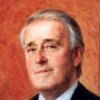Brian Mulroney

Brian Mulroney
Martin Brian Mulroney, PC, CC, GOQ, is a Canadian politician who served as the 18th Prime Minister of Canada from September 17, 1984, to June 25, 1993. His tenure as prime minister was marked by the introduction of major economic reforms, such as the Canada-U.S. Free Trade Agreement and the Goods and Services Tax, and the rejection of constitutional reforms such as the Meech Lake Accord and the Charlottetown Accord. Prior to his political career, he was a prominent lawyer...
NationalityCanadian
ProfessionPolitician
Date of Birth20 March 1939
CountryCanada
Brian Mulroney quotes about
It's my responsibility, and entirely my fault, ... Of course I regret it. It's the kind of locker-room conversation we all use, but as prime minister I shouldn't have used it.
If they don't vote for her, I hope somebody will have the decency to tell them to go stuff it, ... If they won't support a young woman from British Columbia to be prime minister of Canada, I hope they stop talking about western alienation.
He certainly made an important mark on Canadian journalism. I viewed him as a highly principled journalist with well developed views on the world. He was unafraid to assert them and, of course, to defend them.
(Joe) Clark managed to win, but then he blew it so quickly and became an object of scorn and derision, ... But because he lost and was out of it, they liked him, too. If you were a Conservative leader who won, different story. And look, I was a big, brassy guy who won and won big. I did what I wanted.
I concluded that while I was going to be able to get a lot of things done with Reagan, I was not going to be able to get the Acid Rain deal with him.
I was never in the hospital in Halifax in my life, ... He has no medical record, nothing, no evidence. I could prove that I was never in the hospital.
He was an absolutely marvelous human being and a great and historic leader who will be remembered very favorably,
He certainly made an important mark on Canadian journalism.
Bob Coates went to a bar and had a drink with somebody who was less than the daughter of Isabella, ... The media took these isolated things and conveyed the impression that this was a corrupt, indecent group, without offering any perspective.
You cannot name a Canadian prime minister who has done as many significant things as I did, because there are none.
It's my responsibility, and entirely my fault, Of course I regret it. It's the kind of locker-room conversation we all use, but as prime minister I shouldn't have used it.
You accumulate political capital to spend it on noble causes for Canada. If you're afraid to spend your capital, you shouldn't be there.
And, of course, the fact that Maurice Strong, a Canadian, was in charge made it important for us to pull up our socks and become leaders in this field. Now, here is a field we should be a leader in!
We created the Cabinet Committee on the Environment to review the environmental implications of all government initiatives. I think what made us successful was the fact that it was a sustained approach. We did something new every year.